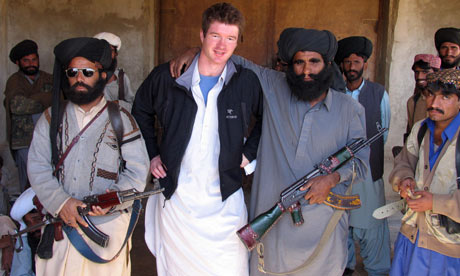The New York Times' Pakistan bureau chief has been expelled from the country, on the eve of the national election.
The paper said Pakistan's Interior Ministry had not explained why it ordered Declan Walsh out of the country. Police officers delivered the interior ministry's order to Walsh at his home at 12.30am local time on Thursday.
"It is informed that your visa is hereby canceled in view of your undesirable activities," the order said. "You are therefore advised to leave the country within 72 hours."
This means Walsh must leave Pakistan by the night of the elections. Saturday's election is being hailed as a milestone in the development of the country's much abused democracy – it is the first time in Pakistan's history that one elected government has handed power to another.
The New York Times urged the country to reconsider the decision and reinstate Walsh's visa. Walsh, 39, was the Guardian's correspondent for Pakistan and Afghanistan from 2004 to 2011. The New York Times hired him in January 2012.
The New York Times' executive editor, Jill Abramson, sent a letter of protest to Pakistan's interior minister, Malik Muhammad Halib Khan, and asked him to reinstate Walsh's visa. "We respectfully request that you overturn this decision and allow Mr Walsh to remain in Pakistan," Abramson said. She said the ministry's accusation "is vague and unsupported, and Mr Walsh has received no further explanation of any alleged wrongdoing."
Abramson also questioned the timing of the order, since the election is being viewed as a democratic milestone. "The expulsion of an established journalist, on the day of the voting, contradicts that impression," she said.

Walsh told the New York Times he was away from his home when he received a phone call from an unrecognized number that said: "Come home now." He said a half-dozen police officers and a plainclothes officer were waiting outside his home. The plainclothes officer then gave him the order and asked him to sign for it.
"I opened the letter in front of him because I knew it was something serious," he said. "This was a complete bolt from the blue. I had no inclination that anything of this sort was coming."
The finger of blame is likely to be pointed at the country's powerful military establishment, which made clear its anger at some of Walsh's reporting, particularly on the CIA's clandestine drone programme, an extremely controversial subject in the country.
In March, Walsh reported that unnamed US officials had denied two drone strikes that had been reported by Pakistan's media, most likely based on information provided by Pakistan's military intelligence service. The report suggested the army "may be using the [drone] program to disguise its own operations".
The story earned a firm rebuke from the army's media office. At the time, a spokesman denied the claims and said "such an accusation is distortion of the facts and seems to be aimed at diluting Pakistan's stance on drone strikes".
The Pakistani military is widely credited as being the most powerful institution in the country and it has repeatedly seized power since the creation of the country in 1947. Civilian authorities are currently in an even weaker position than normal, as the country is ruled by a non-political caretaker government that was appointed to manage the affairs of the country during the general election campaign. A new government is not expected to take office for weeks after the completion of Saturday's election. The process could be even more drawn out if the polls return a hung parliament and a weak coalition government.
No comments:
Post a Comment